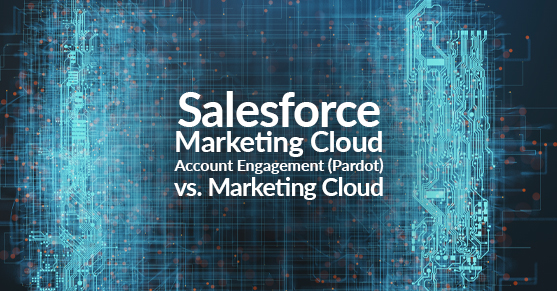Salesforce Pardot, a software as a service (SaaS), is now called Salesforce Marketing Cloud Account Engagement, which allows businesses to create meaningful connections, generate pipelines, empower sales, and grow relationships over time.
This change only adds to the confusion between Salesforce Account Engagement and Marketing Cloud. The critical differences between the two include how long your sales cycle lasts, how many decision-makers influence it, and which marketing channels you use heavily. Also, to narrow it down, Pardot is more positioned as a B2B platform, vs. Marketing Cloud is more for B2C. (although this isn’t always the case, some companies can use both). The main difference is the buying cycle.
The entire Marketing Cloud suite is intended for established marketing departments with the bandwidth to create, tailor, and analyze digital ads, emails, and other assets and are interested in multi-channel engagement, including social/SMS/text message integration.
Pardot is positioned explicitly for B2B marketing, so its strengths lie with aligning marketing and sales, lead management and automated actions, and marketing campaigns. Marketing Cloud offers more outstanding capabilities regarding social media marketing and advertising, plus SMS campaigns.
This is not to say that both B2C and B2B can benefit from Pardot as a marketing automation platform, and to add more confusion; both can also leverage all of the advantages of Marketing Cloud.
So, what are some of the significant differences?
Salesforce Marketing Cloud Account Engagement (Pardot) B2B Marketing Tool
Marketing Cloud Account Engagement customers are scaling their marketing and reaching more leads faster.
- Find more leads and convert them more quickly with content that resonates
- Engage buyers on their terms with tailored, relevant campaigns
- Deliver connected experiences by aligning marketing, sales, and service teams to win deals and build customer loyalty
- Act on insights by tracking marketing performance all in one place
- Design beautiful landing pages with out-the-box functionalities.
- See how customers engage with your emails at every campaign stage.
- Identify high-quality leads before the competition and instantly share them with sales.
- Use Intelligent lead nurturing that adapts to your target audience and segmentation.
- Track marketing performance in real-time.
- Measure your campaigns, and get insights into what resonates.
- Understand how customers move through your sales funnel from click to close.
- Connect your CRM to help your sales and marketing teams work seamlessly.
- Easily integrate with video platform tools like Zoom to bring data from your virtual events.
- Gain visibility into advertising spend with Google Ads Integration.
Pardot (Marketing Cloud Account Engagement) is used for ‘considered purchases’ with long sales cycles and multiple decision-makers –typical of B2B, but not exclusively.
Marketing Cloud B2C
Hundreds of features are available to help you create tailored, relevant content — from essential email marketing tools to sophisticated cross-channel campaign functionality.
- Personalize your email messages with data from Sales Cloud, Service Cloud, and other resources.
- Automate engagement across email, web, mobile, plus more.
- Drive ROI and maximize spend with unified, AI-driven analytics.
- Strengthen your customer relationships with email conversations that drive every stage of the customer lifecycle.
- Deliver more dimensional, interactive, and fun experiences in your subscribers’ inboxes.
- Tailor content, send time, frequency, and more with the help of AI in every email to send the right message at the right time.
Marketing Cloud is best suited to transactional investments in various marketing channels –routine of B2C, but not exclusively.
In terms of pricing, Pardot is generally considered to be more affordable for small to mid-sized businesses. At the same time, Marketing Cloud is geared towards larger companies with more complex marketing needs.
One key difference between the two platforms is the level of integration with Salesforce CRM. Pardot can be easily integrated with Salesforce CRM and shares data seamlessly, allowing sales and marketing teams to work together more effectively. On the other hand, Marketing Cloud is a standalone product that can be integrated with Salesforce CRM, but it requires more setup and customization.
Another difference is that Pardot is more B2B focused and has features such as lead nurturing and scoring tailored to the B2B sales process. Marketing Cloud, on the other hand, is more general-purpose and can be used for a wide range of marketing campaigns and initiatives, including B2C and B2B.
Salesforce Pardot is a B2B marketing automation platform for lead generation and nurturing. Pardot is more affordable and easy to integrate with Salesforce CRM, while Marketing Cloud is more geared towards large businesses with more complex needs. At the same time, Salesforce Marketing Cloud is a more comprehensive platform with a wide range of features for businesses of all sizes, including advanced automation and predictive intelligence capabilities.
What are the limitations?
Salesforce Marketing Cloud Account Engagement (Pardot) Limitations
- Pardot primarily focuses on B2B marketing and may not have all the features needed for B2C marketing campaigns.
- Pardot does not have as many advanced automation and personalization features as Marketing Cloud.
- Pardot does not include social media marketing capabilities and is more limited in web personalization.
- Pardot is more limited in analytics and data management than Marketing Cloud.
Salesforce Marketing Cloud Limitations
- Marketing Cloud can be complex and may require significant setup and customization.
- Marketing Cloud can be more expensive than Pardot, especially for small to mid-sized businesses.
- Marketing Cloud may have more features than a small business needs and may sometimes be overkill.
- Marketing Cloud may require more technical expertise to set up and manage than Pardot.
It’s worth noting that these limitations may not apply to all businesses, as the specific needs and requirements will vary depending on a business’s size, industry, and goals. Additionally, Salesforce is constantly updating and improving its products so that some limitations may be addressed in the future.
Let XTIVIA help you decide which platform is right for you with our certified Salesforce experts; we provide Salesforce consulting services – please, contact us today!

